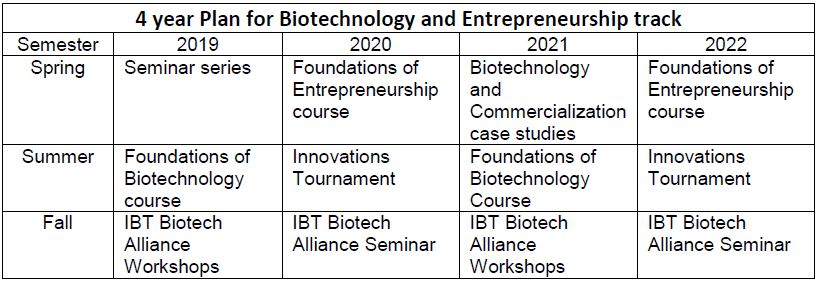IBT Biotech Graduate Track
The Institute of Biosciences and Technology (IBT) was created to provide Texas A&M University with an entry into the Texas Medical Center in Houston. As a land grant university, part of Texas A&M’s mission is to use its research potential to serve the good of the community. It is therefore natural for Texas A&M’s IBT to engage in translational research, as the institute has a history of serving as a base for several successful start-up biotech companies.
Since 1997, the IBT has offered a Ph.D. degree in the Medical Sciences for graduate students interested in learning cutting-edge research at a Tier 1 University in the biggest medical center in the world. Currently, there are five diverse research tracks established under the Ph.D. program, which provides flexible, highly personalized and interdisciplinary training to the graduate students. In an effort to expand training opportunities in our graduate program that meet the needs of a changing workforce, we recently created the IBT Biotech Alliance. The short-term goal of creating this Alliance is to bring awareness of the emerging field of biotechnology and entrepreneurship to our current and future graduate students with the goal of sparking an interest in this field. Our long-term goals are to: 1) provide students with an education in biotechnology and entrepreneurism; 2) set up a support network for aspiring innovators; and 3) enhance the livelihood of the IBT. The IBT Biotech Alliance committee, consisting of Drs. Magnus Hook, Margie Moczygemba, and Srishtee Arora, has been charged with developing a biotechnology and entrepreneurship track in our existing PhD graduate program. In addition to training confident independent scientists, the new track aims to help students learn necessary skills needed for a career in biotechnology, while cultivating a culture of innovation in a productive and collaborative environment.
Curriculum
Successful completion of Ph.D. at IBT, Texas A&M Health Science Center requires 96 credit hours for students with an undergraduate degree and 64 credit hours for students with a Master’s degree. Total credit hour requirement includes research credit hours as well as course credit hours. Current graduate students at IBT are required to take 12 (students with a master’s degree) or 24 (students with an undergraduate degree) course credit hours. The curriculum includes 4 courses focused on the fundamentals of biotechnology and entrepreneurship. They are: 1) Foundations of Biotechnology; 2) Foundations of Entrepreneurship; 3) Case Studies based on biotechnology and commercialization; and 4) Entrepreneurship workshops. Each class is worth 2 credit hours, for a total of 8. These 8 credit hours will count towards the total credit hours required for graduating with a Ph.D. in the Medical Sciences at IBT, while acknowledging that different credit hours are required for students entering with a Bachelor’s or Master’s degree.
The following topics will be covered in the Foundations of Biotechnology course:
- Recombinant Proteins as Therapeutics
- Clinical Diagnostics
- Genome Editing and Gene Therapy
- Biosensors
- Medical Devices
- Nanotechnology
- Biomaterials
- Immunomodulators as Therapeutics
- Toxicity Testing in Animal Models
The following topics will be covered in the Foundations of Entrepreneurship course:
- Global biotech industry
- Science to Business to Clinic
- Intellectual property protection
- Startup company dynamics
- Startup financing and valuations (Venture capitalists)
- Stock options and compensations
- Market research
- Business plan formulation
- Regulatory body interaction
- Landmines on the road to success
The biotechnology and commercialization case studies course will involve case studies developed by medical start-up companies in the Texas Medical Center. We also seek to provide students with hands-on experience on how to start their own company through our entrepreneurship workshop and seminar series. To this end, we will invite entrepreneurs, investors and consultants to share their real-life experiences with our students, and also provide critical networking opportunities for them.

